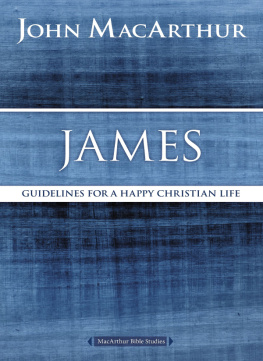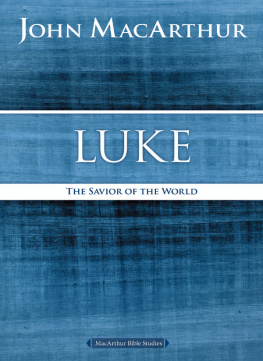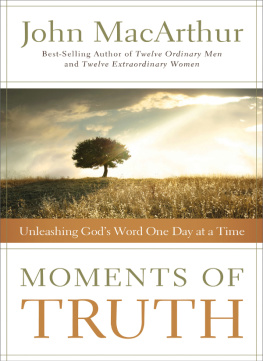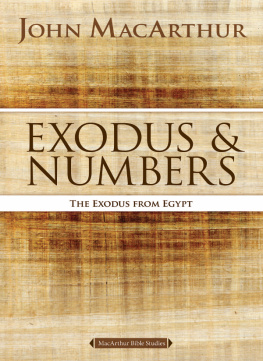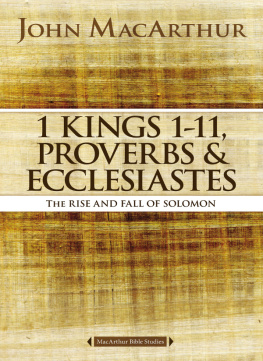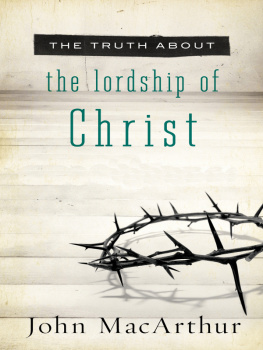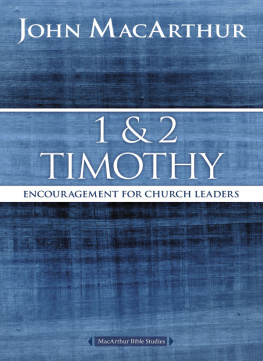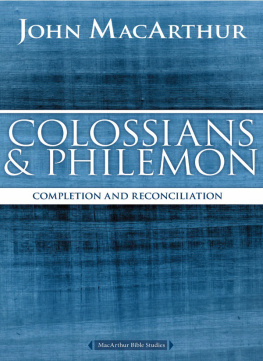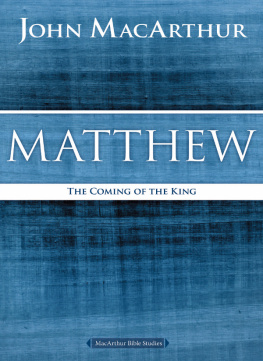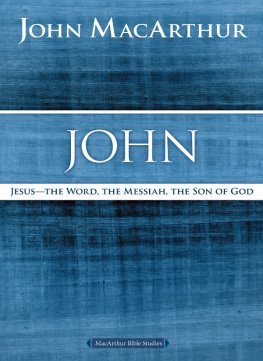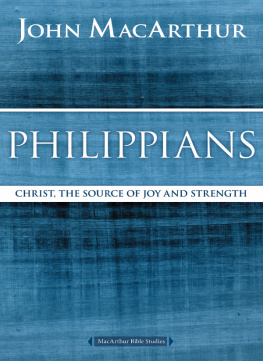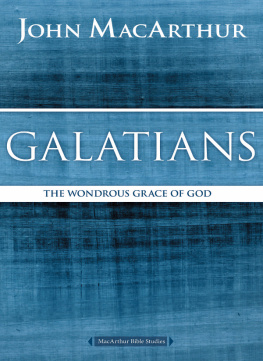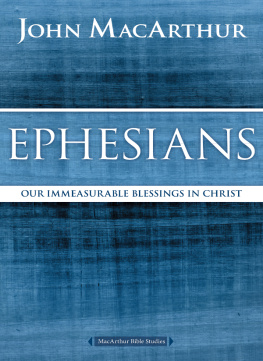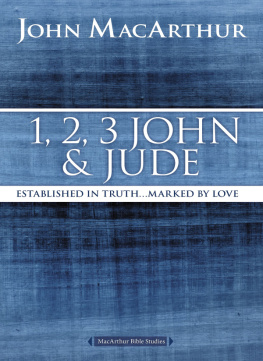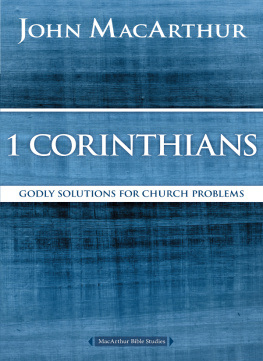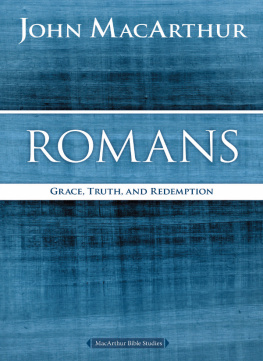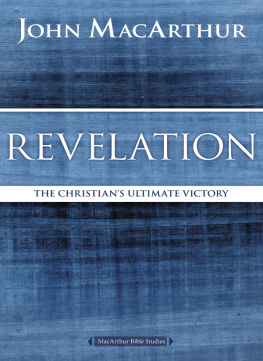
JAMES
MACARTHUR BIBLE STUDIES
2007, John MacArthur
All rights reserved. No portion of this book may be reproduced, stored in a retrieval system, or transmitted in any form or by any meanselectronic, mechanical, photocopy, recording, or any otherexcept for brief quotations in printed reviews, without the prior permission of the publisher.
Published in Nashville, Tennessee, by Nelson Books, an imprint of Thomas Nelson. Nelson Books and Thomas Nelson are registered trademarks of HarperCollins Christian Publishing, Inc.
Nelson Books titles may be purchased in bulk for education, business, fundraising, or sales promotional use. For information, please email SpecialMarkets@ThomasNelson.com.
Published in association with the literary agency of Wolgemuth & Associates, Inc.
Produced with the assistance of the Livingstone Corporation. Project staff include Jake Barton, Betsy Todt Schmitt, and Andy Culbertson. Project editors: Mary Horner Collins, Amber Rae, and Len Woods.
Scripture quotations marked NKJV are taken from the The New King James Version. 1982 by Thomas Nelson, Inc. Used by permission. All rights reserved.
Unleashing Gods Truth, One Verse at a Time is a trademark of Grace to You. All rights reserved.
Context and some Truth for Today material taken from James: MacArthur New Testament Commentary Series. 1998 by John MacArthur. Published by Moody Press: Chicago, Illinois. Used by permission.
Keys to the Text material taken from the following sources:
1 Corinthians: MacArthur New Testament Commentary Series. 1984, 1996 by John MacArthur. Published by Moody Press: Chicago, Illinois. Used by permission.
The Freedom and Power of Forgiveness (electronic edition) 1998 by John MacArthur. Published by Crossway Books: Wheaton, IL. Used by permission.
Galatians. MacArthur New Testament Commentary Series. 1987, 1996 by John MacArthur. Published by Moody Press, Chicago, Illinois. Used by permission.
The Gospel According to Jesus (electronic edition). 1988, 1997 by John MacArthur. Published by Zondervan: Grand Rapids, MI. Used by permission.
James: MacArthur New Testament Commentary Series. 1998 by John MacArthur. Published by Moody Press: Chicago, Illinois. Used by permission.
The MacArthur Study Bible (electronic edition). John MacArthur, General Editor. 1997 by Word Publishing. All rights reserved. Used by permission.
Nelsons New Christian Dictionary. George Thomas Kurian, Editor. 2001 by Thomas Nelson, Inc.
Cover Art by Holly Sharp Design
Interior Design and Composition by Joel Bartlett, Livingstone Corporation
ISBN: 978-0-7180-3516-7
ISBN: 978-0-7180-3535-8 (eBook)
First Printing April 2016
In this ebook edition, please use your devices note-taking function to record your thoughts wherever you see the bracketed instructions [Your Notes] or [Your Response Here]. Use your devices highlighting function to record your response whenever you are asked to checkmark, circle, underline, or otherwise indicate your answer(s).
CONTENTS
James, like all the general epistles except Hebrews, is named after its author (v. 1).
AUTHOR AND DATE
Of the four men named James in the New Testament, only two are candidates for authorship of this epistle. No one has seriously considered James the Less, the son of Alphaeus (Matt. 10:3; Acts 1:13), or James the father of Judas, not Iscariot (Luke 6:16; Acts 1:13). Some have suggested James the son of Zebedee and brother of John (Matt. 4:21), but he was martyred too early to have written it (Acts 12:2). That leaves only James the oldest half brother of Christ and brother of Jude (Matt. 13:55; Mark 6:3; Jude 1). James had at first rejected Jesus as Messiah (John 7:5), but later believed (1 Cor. 15:7). He became the key leader in the Jerusalem church (see Acts 12:17; 15:13; 21:18; Gal. 2:12), being called one of the pillars of that church, along with Peter and John (Gal. 2:9). Also known as James the Just because of his devotion to righteousness, he was martyred ca. AD 62, according to the first-century Jewish historian Josephus. A comparison of Jamess vocabulary in his letter recorded in Acts 15 with that in the epistle of James further corroborates his authorship.
| James | Acts 15 |
| 1:1 | greetings | 15:23 |
| 1:16, 19; 2:5 | beloved | 15:25 |
| 1:21; 5:20 | your souls | 15:24 |
| 1:27 | visit | 15:14 |
| 2:10 | keep | 15:24 |
| 5:1920 | turn | 15:19 |
James wrote with the authority of one who had personally seen the resurrected Christ (1 Cor. 15:7), who was recognized as an associate of the apostles (Gal. 1:19), and who was the leader of the Jerusalem church.
James most likely wrote this epistle to believers scattered abroad as a result of the unrest recorded in Acts 12 (ca. AD 44). There is no mention of the Council of Jerusalem described in Acts 15 (ca. AD 49), which would be expected if that Council had already taken place. Therefore, James can be reliably dated ca. AD 4449, making it the earliest written book of the New Testament canon.
BACKGROUND AND SETTING
The recipients of this book were Jewish believers who had been dispersed, possibly as a result of Stephens martyrdom (Acts 7, AD 3134), but more likely due to the persecution under Herod Agrippa I (Acts 12, ca. AD 44). The author refers to his audience as brethren fifteen times (1:2, 16, 19; 2:1, 5, 14; 3:1, 10, 12; 4:11; 5:7, 9, 10, 12, 19); this was a common epithet among first-century Jews. Not surprisingly, then, James is Jewish in its content. For example, the Greek word translated assembly (2:2) is the word for synagogue. Further, James contains more than forty allusions to the Old Testament (and more than twenty to the Sermon on the Mount, Matt. 57).
HISTORICAL AND THEOLOGICAL THEMES
James, with its devotion to direct, pungent statements on wise living, is reminiscent of the book of Proverbs. It has a practical emphasis, stressing not theoretical knowledge but godly behavior. James wrote with a passionate desire for his readers to be uncompromisingly obedient to the Word of God. He uses at least thirty references to nature (e.g., wave of the sea [1:6]; reptile [3:7]; and heaven gave rain [5:18]), as befits one who spent a great deal of time outdoors. He complements Pauls emphasis on justification by faith with his own emphasis on spiritual fruitfulness demonstrating true faith.
INTERPRETIVE CHALLENGES
At least two significant texts challenge the interpreter: (1) In 2:1426, what is the relationship between faith and works? Does Jamess emphasis on works contradict Pauls focus on faith? (2) In 5:1318, do the promises of healing refer to the spiritual or the physical realm? These difficult texts are treated in the notes for those chapters.
DRAWING NEAR
James opens his book by emphasizing the reality of hard times. How do you usually respond to trials or setbacks in your life? Why?
[Your Response Here]
Describe a situation in which a Christian you know has handled a difficult trial with exceptional grace and humility. What do you think made the difference? What was his or her secret?
[Your Response Here]
What do you want to learn in this study? Ask God to open your heart and mind to be receptive to the no-nonsense approach to living out your faith.
Next page
